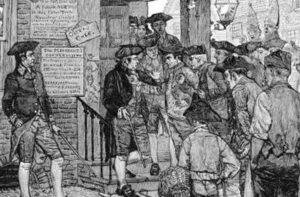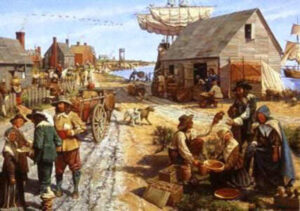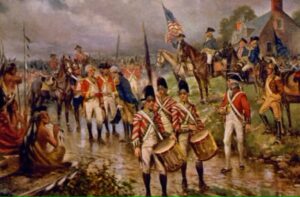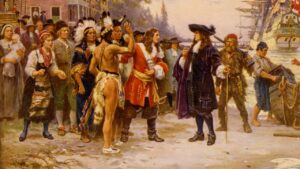
 If you travel to a different area of the country or even other English-speaking areas of the world, you will find that here are different accents and even that words are used differently. Still, just because you are visiting or move to those places, doesn’t mean that you will immediately take on those accents, or their use of words. Nevertheless, when you move to a different region, your use of the language does immediately begin to evolve, whether you realize it or not, and whether it is intentional or not. The first Englishmen to set foot on American soil with the intent to colonize the land were no exception. The language began to evolve almost immediately….and it remains a fluid, almost living process to this day. “Americanisms” have been created or changed from other English terms to produce a language that very much differs from our forefathers, signifying our uniqueness and independence.
If you travel to a different area of the country or even other English-speaking areas of the world, you will find that here are different accents and even that words are used differently. Still, just because you are visiting or move to those places, doesn’t mean that you will immediately take on those accents, or their use of words. Nevertheless, when you move to a different region, your use of the language does immediately begin to evolve, whether you realize it or not, and whether it is intentional or not. The first Englishmen to set foot on American soil with the intent to colonize the land were no exception. The language began to evolve almost immediately….and it remains a fluid, almost living process to this day. “Americanisms” have been created or changed from other English terms to produce a language that very much differs from our forefathers, signifying our uniqueness and independence.
Of course, the people didn’t notice the changes right away, but by 1720, the English colonists began to notice that their language was quite different from that spoken in their Motherland. I’m sure they wondered just how that came to be? Basically, when you hear new “slang” words, and people don’t hear the accents spoken as well, the whole dynamic of the language changes. Also, very formal words like “thee, thou, and such” might become too cumbersome and so they are discarded. Everyone in the colonies knew that English would be our native language by 1790, because when the United States took its first census, there were four million Americans, 90% of whom were descendants of English colonists. So, it made perfect sense.
Nevertheless, it would not be the same as that spoken in Great Britain. The reasons are varied, but the most obvious reason was the sheer distance from England. The main way the language evolved was that over the years, many words were borrowed from the Native Americans, as well as other immigrants from France, Germany, Spain, and other countries. In addition, words that became obsolete “across the pond” continued to be utilized in the colonies. In other cases, words simply had to be created in order to explain the unfamiliar landscape, weather, animals, plants, and living conditions that these early pioneers encountered. By 1790 it was obvious that American English would be a very different language that British English.
The first “official” reference to the “American dialect” was made in 1756 by Samuel Johnson, a year after he published his Dictionary of the English Language. Johnson’s use of the term “American dialect” was not meant to simply explain the differences but rather, was intended as an insult. This “new” language was called “barbarous” and referred to our “Americanisms” as barbarisms. Because of the dissention between England and the Colonies, the British sneering at our language continued for more than a century after the Revolutionary War. They laughed and condemned as unnecessary, hundreds of American terms and phrases, but to our newly independent Americans, they were proud of their “new” American language and considered it to be another badge of independence. In 1789, Noah Webster wrote in his Dissertations on the English Language, “The reasons for American English being different than English English are simple…As an independent nation, our honor requires us to have a system of our own, in language as well as government.” In the eyes of the Colonists, that settled the matter, and when the United States was formed, the new nation was proud to be separated for the “Motherland” and would have it no other way.
Our leaders, including Thomas Jefferson and Benjamin Rush, agreed — it was not only good politics, but it was also sensible. The most atrocious changes to the British were the heavy use of contractions such as ain’t, can’t, don’t, and couldn’t. The feelings of the “rest of the world” didn’t matter to Americans, and the language changed even more during the western movement as numerous Native American and Spanish words became an everyday part of our language. The evolution of the American language continued into the 20th century and really continues even to this day. After World War I, when Americans were in a patriotic and anti-foreign mood, the state of Illinois went so far as to pass an act making the official language of the state the “American language.” In 1923, in the State of Illinois General Assembly, they passed the act stating in part, “The official language of the State of Illinois shall be known hereafter as the ‘American’ language and not as the ‘English’ 
 language. A similar bill was also introduced in the US House of Representatives the same year but died in committee. Ironically, after centuries of forming our ‘own’ language, the English and American versions are once again beginning to blend as movies, songs, electronics, and global traveling bring the two ‘languages’ closer together.”
language. A similar bill was also introduced in the US House of Representatives the same year but died in committee. Ironically, after centuries of forming our ‘own’ language, the English and American versions are once again beginning to blend as movies, songs, electronics, and global traveling bring the two ‘languages’ closer together.”


One Response to American English Vs English English